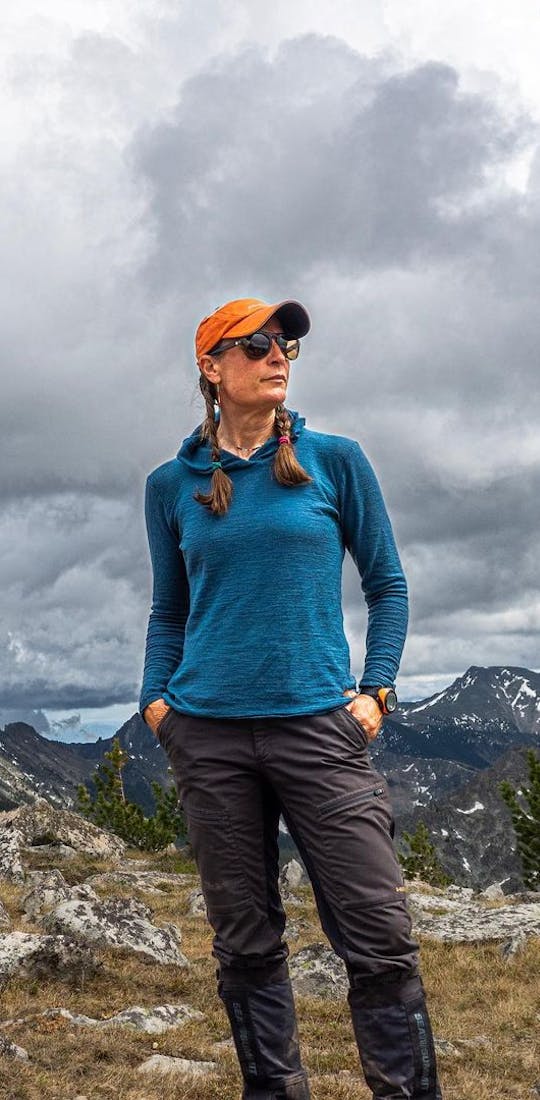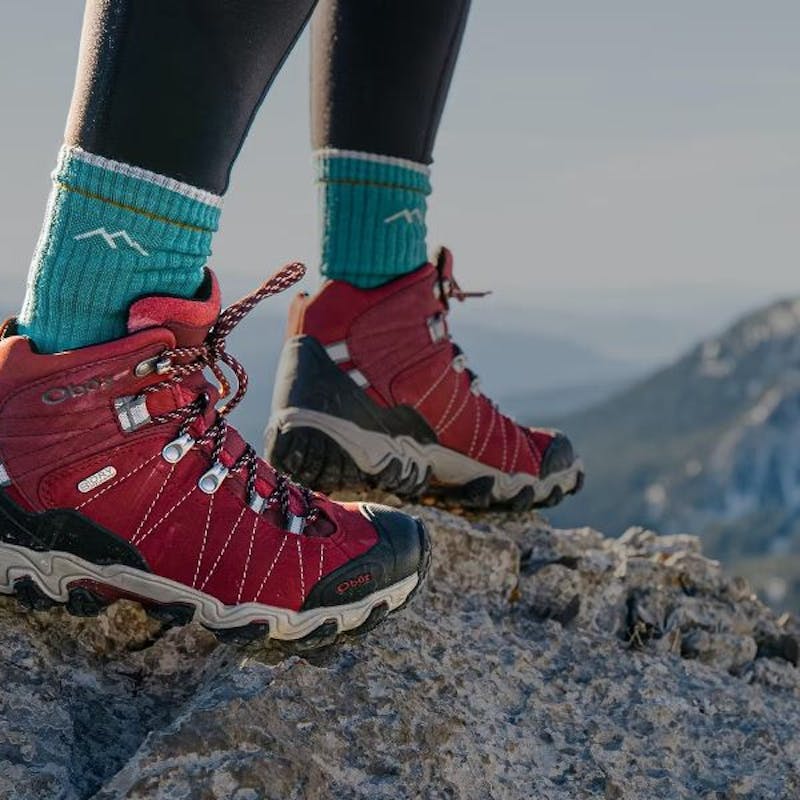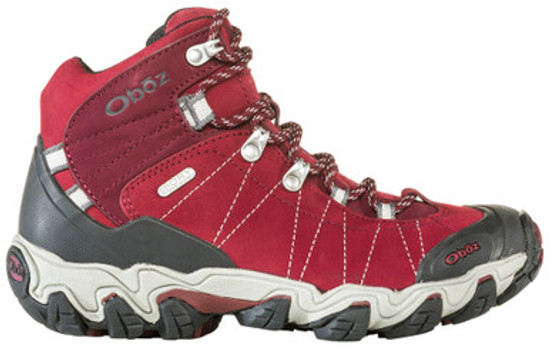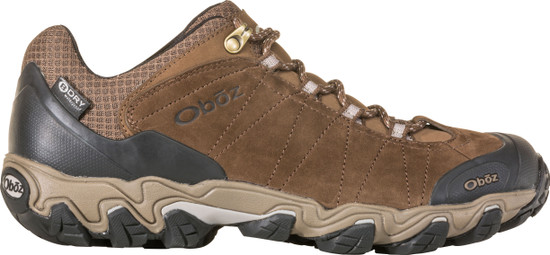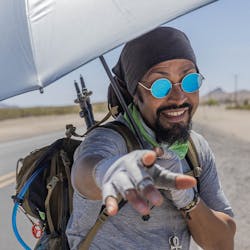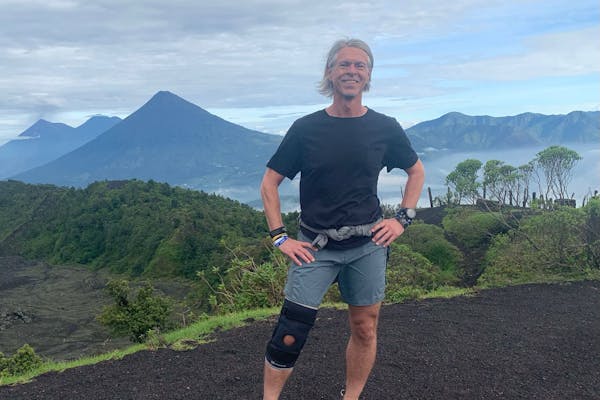Meet Oboz Local Hero, Hallie Zolynski. A lifelong Montanan, wildland firefighter, and founder of Beyond the Backcountry.
Hallie, I'm thrilled about our chat today. When Oboz approached me for this Local Hero series, my response was immediate. I enthusiastically agreed because it presents an opportunity to engage with outdoor individuals like yourself.
I noticed in your bio that you mentioned your family's outdoor background, yet you didn't fully embrace it until your late twenties. I'm curious, what was the turning point that ignited your passion for the outdoors? Was there a particular experience or realization in your life that prompted you to dive into outdoor activities?
Hallie: Wildland firefighting.
I grew up in rural Whitehall, Montana, and my family had cows growing up. We just did chores. I got into track and field when I was in high school, but we didn't really do much as a family outdoors. We were outside a lot, but it was chore-wise. So, when I was doing wildland firefighting in Minneapolis, I just loved being outdoors. I loved what it did for me because my teenage years weren't great in school. I got teased a lot and I didn't have a lot of friends. With the wildland firefighting, we have this community of people and it showed me that being outside is where I wanted to be. I thought that it was so great because everyone treated me like family. I wasn't teased, people were interested in what I did, and I loved that. That's what sparked it, the wildland fire community. It was such an awesome feeling inside, a feeling like I belonged somewhere finally.

Derick: You completed the Oboz Trail Experience: Tucson and the Fast Trail Challenge, correct?
Hallie: Yeah, and I just completed the Bozeman one yesterday.
Derick: Nice. How many miles of the Tucson trails did you do?
Hallie: I did all 120 miles of the Oboz Trail Experience in 5 days.
Derick: That's quite impressive, I must say. I took part in last year's Fast Trail challenge as well. It spanned 10 consecutive days, and I managed to keep up the momentum. Currently, I've been hiking at least 3 miles a day for nearly a year now, and I'm thoroughly enjoying it. You mentioned the Bozeman one—what exactly does that entail?
Hallie: Yeah, the Bozeman winter challenge. It's 103 miles, it starts February 1st, and it goes till the end of February, and you can do as many trails as you want. Just to get out and promote the trails in winter. February 1st my partner and I did 53 miles in two days. Unfortunately, I got a good shin splint, and took a couple of weeks off. As of this last Saturday I completed the whole 103 miles, so I was pretty happy. What’s cool is that I was able to create a team called Team Maliki for the challenge, and a few others joined. One lady had never completed the challenge before, but with our support, we all finished strong, coming in second. It was heartwarming to see everyone inspire each other and do so well.
Derick: That is heartwarming. The outdoor community strikes again.
So, you also have a small business called Beyond the Backcountry. Could you share a little bit about that?
Hallie: Beyond the Backcountry started because I wanted to teach people to be safe, and I wanted it to be affordable. When I started, I didn't have money, and so I couldn't take the cool guided courses that people were taking because they were expensive, so I was just going out winging it. Then I started volunteering so I could get that knowledge. When I did get some money saved up, I started taking classes to be able to teach people. My thing has always been that I want to make this affordable so people who traditionally can't get outside and do those things because they don't know how to. With safety it's hard, you got to know what you're doing, and I want people to be safe out there.
I do a business model where I'm teaching people wilderness first aid. I'm teaching them avalanche safety skills, and I keep it at an affordable price. I'm teaching the exact same thing that you learn in a class that's four or five hundred dollars but I'm giving it at a huge discount.
If I charge more money, I'll get those people that can pay that, but then where are the people who can't afford that going to go? They're going to be stuck not going outside or not doing so safely. I would rather take a hit on my business and just teach people how to be safe. It's fun, I love teaching people who just want to get out there because I get such a variety of cool people coming to my classes and I've made friendships that are still friends to this day.
Derick: I love that you do that. Alright, can you give us a quick lesson on what to do if an avalanche is approaching us?
Hallie: First, if you see it in the distance, staying in the tree line and on the sides of it is your best option.
If you see one, hopefully, no one is in it. You yell "avalanche!". That's the first thing, and if anyone else is around they would be aware of it. After that you would stick as far away as you can and don't get in that debris field just stay away from it.
Derick: So put my phone down, no photos or videos. Check.
Hallie: Yes, and another helpful thing is reporting it.
I always tell people when I go to a trailhead in the winter I look at how many other cars are there. If there are four cars in the parking lot that's a least four people I have to worry about that might be out there, that could have been caught in that avalanche. Know where they're at and your surroundings and then report it.
Derick: Yeah. I can see how those are the two most crucial actions you can take to assist yourself and others.
Derick: You're a Ranger?
Hallie: Yeah, wilderness Ranger.
Derick: What are the duties of a wilderness ranger?

Hallie: First and foremost, our job is protecting the wilderness and going out there to do trail maintenance like cross-cutting trees. Then make sure that people are doing the right thing for the wilderness because solitude and feeling like you're outside in the wilderness is huge. So, what we do is we go on trails every day, we'll pick a trail system, and we'll go on that trail. My job is first off to make sure people aren't making campfires where they're not supposed to be. I also clean up areas: Naturalizing areas back to nature, so nature can take those areas over that are getting a little overrun. We crosscut all the trees out on the trail. Make sure that it's nice and safe for people to go in there. We assess how things are going in that wilderness because we're stewards of that wilderness. That's my biggest passion, is making sure that it's preserved for future years is what we do.
Derick: Your dedication is greatly appreciated. Oboz and I are curious, what is your favorite local trail system?
Hallie: I would think it's probably the Anaconda Pintler Wilderness. That trail system is beautiful, and one of the best ones is the CDT that runs through it. I love it.
Derick: Oh wow, you know, two years ago, I completed the CDT, and my favorite segment was in Montana State.
Hallie: Yeah, so it would be that section. I just love it. The CDT section would be probably my favorite trail through the wilderness.
Derick: Very cool. What's your favorite local Oboz dealer?
Hallie: I like Shedhorn Sports in Ennis Montana. They have the nice sizing. I can size my stuff up. They have all the different brands, it's pretty cool.
Derick: Nice. What Oboz footwear do you prefer?
Hallie: I got the Bridger. I literally wore the Bridger for this Bozeman challenge, and I did 53 miles, with not a single problem.
Derick: This is one of the primary reasons I resonate with Oboz; having tried various boots in the past, I've often encountered the need to break them in, leading to uncomfortable blisters, especially during thru-hikes. However, Oboz shoes stand out as the first ones I can simply wear without the hassle of breaking them in.
That's fantastic—you covered 53 miles with a new pair of Oboz, and everything went smoothly. Awesome indeed!
Can you give a pro tip for folks hitting the trail or anything unique you want to share with people?
Hallie: This is going to be a unique one. I always bring battery-powered Christmas lights. I always tell people to bring something in your pack that makes you happy and reminds you of something special. Because if something does happen, you'll have that. Little mementos, like a little Talisman to have with you.
Derick: Great idea! I’m now going to start decorating my tent with lights.
Who nominated you for this local heroes piece?
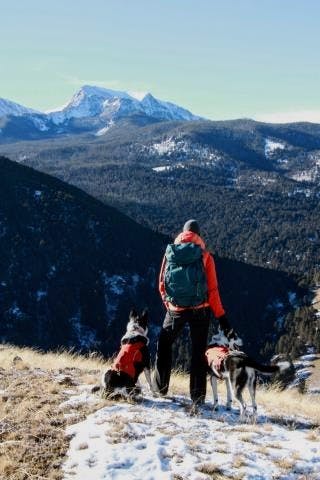
Hallie: Jason Leslie is who nominated me. He's my partner, and he is one of my biggest supporters. He has always told me, “Just go for it. Do you, and who cares what people think.” He’s an amazing person. He's just been that person.
Derick: Way to go, Leslie! Ok, final question: For someone contemplating a move to Montana but hesitant due to the long winters, what's one aspect of Montana that might sway their decision?
Hallie: Oh boy, there's so many different things, but I honestly think the people. I was born and raised 4th generation Montana, and we are some of the most helpful, down-to-earth, honest people you'll meet. It's that cool small-town feel. Our mountains are beautiful, but I think it goes back to the community, our communities really do help each other out a lot.
Derick: I'm packing my bags; Montana, here I come! Thanks, Hallie. It was a pleasure chatting with you.
Hallie: You too! Have a wonderful day.
